#ttrpg 101
Explore tagged Tumblr posts
Text
I got the chance to work with Choopo on his Wizard101 Lore series and I'm extremely appreciative that I got the chance to help him on his quest.
youtube
It was a lot and I'm not done documenting yet, there's plenty of Arc 5 speculation going on and I'm interested to see where this EarthBorn plot point from the end of Selenopolis will take the Wizard next.
I'm also working on an overall for Mage The Ascension (from the line of World Of Darkness TTRPGs) that will allow you to play as a wizard from any angle or side of the Spiral, I'll make sure to post updates here.
(This currently infant pet-project will absolutely/most-definitely be free because I have no idea what kind of legalization surrounds both KingsIsle and WOD these days but it would still be fun to get the chance to play as a Wizard of the Spiral and even more so to shape a system to allow you to do exactly that)
Thank you for this opportunity, and I look forward to working on many future projects.
#mage the ascension#wizard101#kingsisle#world of darkness#choopo#youtube#ttrpg#pet project#wizard#wizard 101#pirate101#table top role playing game#Youtube
89 notes
·
View notes
Text

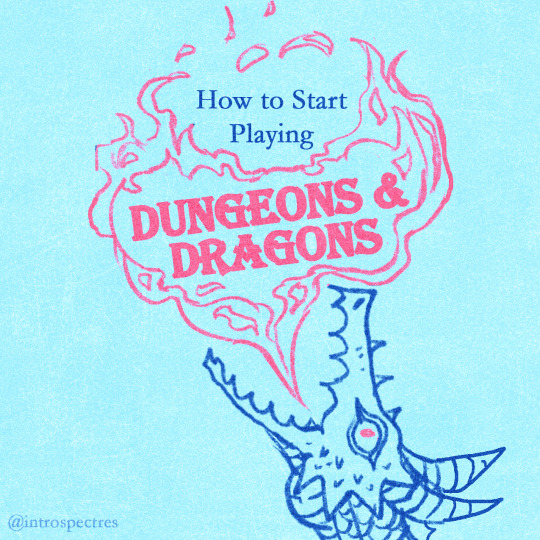
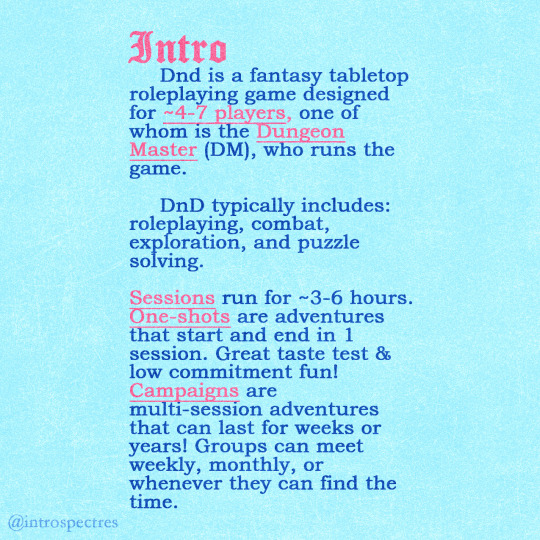
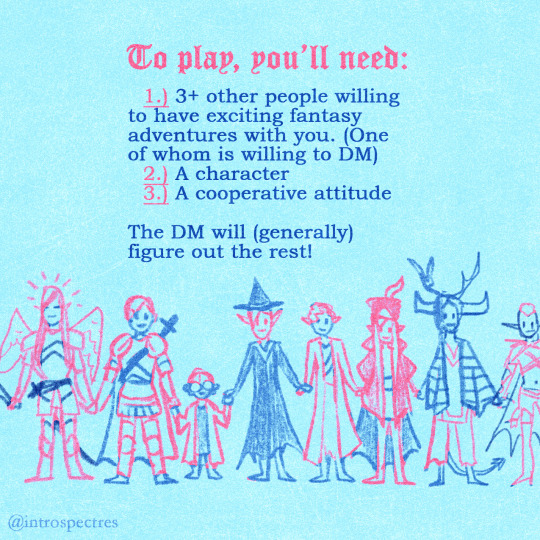
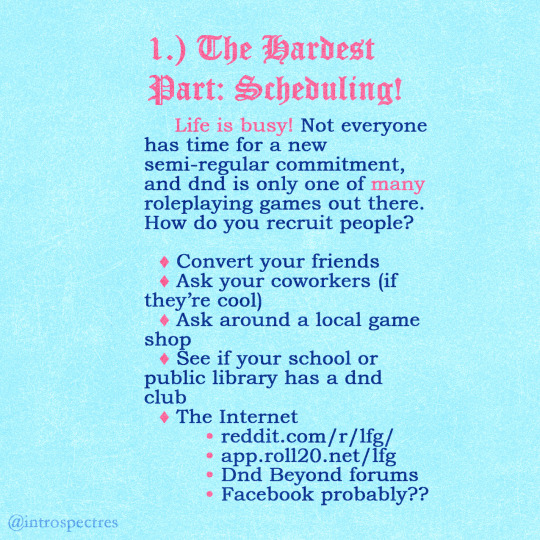
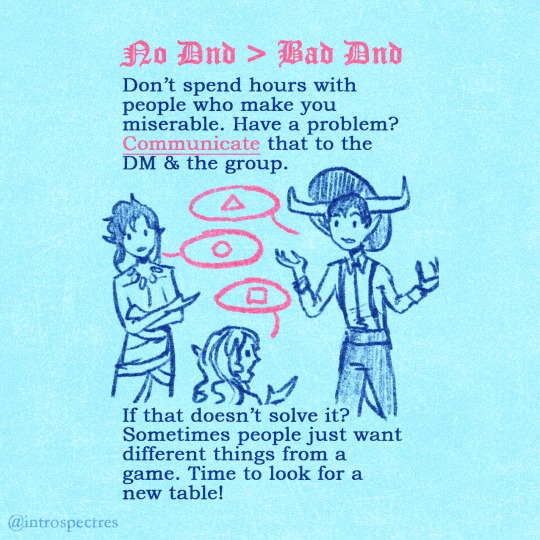
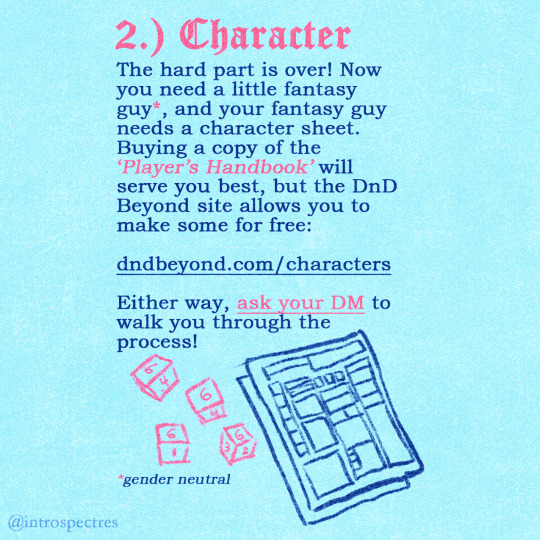
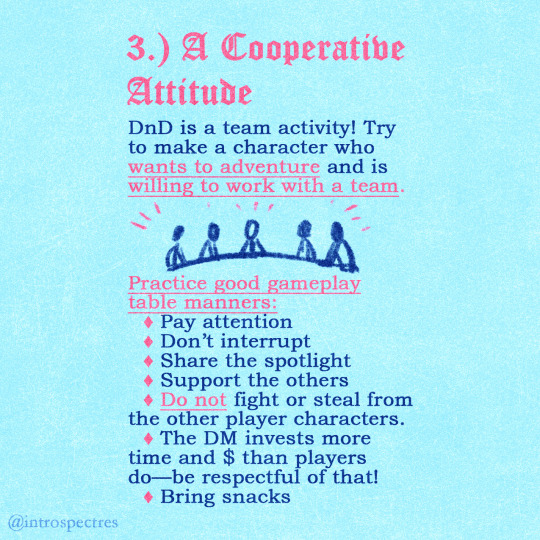
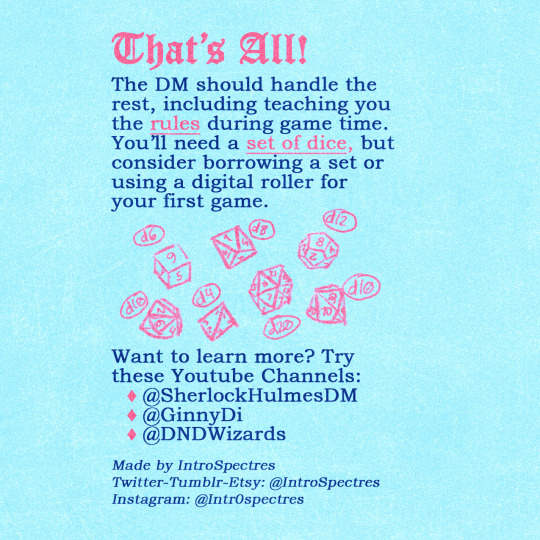

I’ve tried to answer this ask many times, but my answer kept bloating into this massive unwieldy text wall. So, I challenged myself to fit as much as I could into an 8-page mini zine—something bite-sized I could just hand out to people—and this was the result!
Resources & Further Reading:
* Looking for Games: [reddit] [roll20] [dndbeyond] * DnD Beyond Character Creation * DnD Youtubers: [Mark Hulmes] [Ginny Di] [D&D Official] * Multiplayer ttrpgs that aren't dnd * Single-player ttrpgs * Shop: [$2 physical copy]
#I accidentally deleted the original post when I was trying to delete a reblog :'''(#dnd#dnd 5e#ttrpg#mine#dungeons and dragons#dnd 101#dnd tutorial#mini zine#ashcan zine
79 notes
·
View notes
Text
i love that we have two really cool n important character convos and then charlie slimecicle on the hunt for the most op item that of fucking course grizzly is not going to fuckin give him because hes sane man
#im saying charlie and not gillion because again charlie likes to take ttrpg mechanics and mold them like clay for his evil plans#jrwi riptide ep 101#jrwi riptide#charlie slimecicle
40 notes
·
View notes
Video
youtube
Siren's Song, A Mountain Remorse, a Lancer first-party supplement, is out! So let's about the talents within it!
28 notes
·
View notes
Text

11 notes
·
View notes
Text
Six items ready to be inserted into any Dragonbane campaign. Compatible with any fantasy tabletop roleplaying game with minimal conversion required. Have fun!
#rpg#rpgblog#rpgblogger#rpgwriter#ttrpg#TTRPGblog#TTRPGblogger#ttrpgdesign#ttrpgwriter#Dungeon Master Tips •#Game Master Guide •#Game Master Tips •#Game Mastering 101 •#GM Advice for Beginners •#How to GM a Game •#How to Prepare for a TTRPG Session •#Improve Your GM Skills#Roleplaying Game Advice •#Roleplaying Game Strategies •#RPG Community •#RPG Session Planning •#Running a Tabletop RPG •#Tabletop Roleplaying Games •#Tabletop RPG Storytelling •#TTRPG Resources •#TTRPG Session Prep •
1 note
·
View note
Text
in the case of the people vs. bell's hells...
and also the campaign 3 finale overall. disclaimer: this is gonna get long bc of my propensity to yap so i'm gonna simultaneously try to keep it short but also put it under a "read more." spoilers will be referenced throughout.
i wouldn't call these rent-lowering gunshots, but i desperately need some of the folks in this fandom to get a grip. so instead i'm asking: walk with me. hold my hand. i am looking you in the eyes and want this fandom to be a nice place. please forgive me for any attitude but i am tired of being talked down to.
"they never faced any consequences" consequences are the result bad dice rolls. of which they had plenty. if you think their narrative choices should have resulted in more punishment, say that. but i think you missed the part where they have targets on their back from several factions and now-mortal deities and you need to kill the cop in your head.
"it was too confusing and the pacing was bad" i don't even disagree with this takeaway. i will say this was actually the easiest campaign for me to follow. m9 is so fun, but was very narratively scattered at times. however, i think this is just the nature of ttrpg/actual play. it's not scripted. it's messy and sometimes you'll zone out about it. sometimes what the players want isn't what grabs you personally. it doesn't mean they're wrong or bad to play it that way.
"i fell off c3 and everything i've heard about the finale is stupid" fall off, then. totally fine, i'm not here to stop you, sincerely. and not to hurl cliches, but with tabletop it really is more about the journey than the destination. without context, you are missing too many pieces to pass judgement. that's all i'm gonna say on that.
"the other PCs were just so much better" i gotta say this one seems like a skill issue lol. there's not a single party i haven't loved with my whole heart, but they satisfy different purposes or dynamics! vm was destined for greatness. m9 was destined to pull important strings. bh was destined to shake up the order of things. they were supposed to be controversial in-world. they're salt of the earth, rising far beyond their stations ever expected. they became important at work and it very nearly ruined their lives.
"it was like sitting in a philosophy 101 class" praytell what philosophy classes that you've sat in discussed the ethics of magic, direct divine involvement in human* lives, and potential outcomes that would come along with killing all the gods or releasing something called the god-eater. look. i grew weary with the rehashing of these conversations too, really i did. that said, i think it needed to play out this way in order for the finale to go the way it did.
allow me to explain. one of the defining qualities of bell's hells was how different they all were. whether it's their perspectives, life experiences, backgrounds, desires, aspirations... you get it. this was the point. they were bound together by compassion and love for each other. and this extended to those they stood for personally, and those their friends cared about. it was how they approached ruidus, the gods, the people of vasselheim. and they walked the walk and trusted the process, prepared to face anything. including death.
*obviously including all exandrian/ruidian races beyond just human
"the finale cheapened the ending of vox machina" it didn't. i'm sorry but it very fundamentally did not and if that's your takeaway from a change of circumstance ~30 years down the line, i am worried that you are too lost in the sauce due to favoritism. if your takeaway from vax being allowed to return to the material plane is that now his conclusion from 30 years ago was just him going on a work trip, that is a you problem.
the narrative doesn't treat it like that. the characters don't treat it like that. the cast doesn't treat it like that. let me repeat myself: if you think vax's c1 ending is now nothing more than a glorified work trip, that is a you problem.
life goes on. the state of the world is changing constantly, especially in a world with gods and magic and different planes of existence. matt allowed these players to have direct involvement in the ways it changes. if vax was allowed to return in some capacity as a result of those changes, the cast made that happen. it wasn't even on bell's hells priority list! this was a natural change of circumstance. if that's the kind of thing you find upsetting, maybe unpack that elsewhere.
i'm gonna wrap it up here but i hope you keep this in mind: if you don't like a thing anymore, you can absolutely drop it. you don't need anyone's permission. but what i ask is that if you want to engage in thoughtful conversation and criticism about it, you keep these things in mind.
i don't believe this show or cast to be above criticism. i have plenty of critiques of my own. but the campaign three finale was the opposite of bad. it was the most satisfying conclusion we could have possibly gotten. it was the culmination of the last 3 years with almost everyone who encountered bell's hells and honored the last 10 years of their hard work. i am so so proud of matt and the cast and i think you should be too.

#critical role spoilers#cr spoilers#cr#i needed to get this off my chest#hope this reads as equally petty and sincere bc i am so sick of being talked to like i'm an idiot for enjoying this#BY MY OWN STUPID FANDOM#i'm a writer with a comms/media studies degree i think you're just throwing a fit about things changing#if you really want to see a lackluster and insulting conclusion to a beloved franchise you should try dragon age veilguard#and if you're thinking about arguing with me in the comments or replies please reconsider#try self reflection instead
95 notes
·
View notes
Note
A question of curiosity - assuming you play them due to your involvement with a bunch of them, what are your favourite kinds of characters (be it mechanically or narratively) to play in TTRPGS? And do you have any associated anecdotes to go with them?
courtesy readmore
mechanically kinda depends on what's on the menu, but if it's combat-focused, I personally really enjoy characters who "deny" things
not really the kind of character who I'd ever expect a GM to put in their element on purpose (I usually make a conscious effort to remind the GM of things I'm capable of so that I don't trample on any fun setpieces) but definitely the kind of character who modifies objectives just by being in play. I also like magic-users in concept, but that's more of a flavour thing
I think that's reflected a good bit in the kind of narrative play I enjoy, too. when I make a character, I prefer to do it with the rest of the party in mind, less to make the character "compatible" and more to make them sharply contrast in ways that encourage the other characters to have moments where they can reaffirm who they are (both in narrative and out of narrative)
there's a fine balance to strike here. on one end of things, you risk yes-manning so hard that the party quickly becomes a problem solving engine with a single striking surface. on the other end of the things, you risk being The Chaotic Neutral Guy
the space in the middle there represents the characters that people often want to regularly interact with, but rarely want to play. the sort of character who isn't actively disruptive, but raises a lot of red flags when they suddenly show enthusiastic agreement for what you're doing. the kind of character you almost need a diminished sense of discomfort to play without getting in your own feelings about
I adore playing characters who are catered to find plot hooks in other players' characters and tug them just enough to pull them to the surface
most parties have characters who disagree on things that aren't easily resolved. that's always fun, but (because people courteously tend to avoid conflict) it's very rare for those conflicts to come up without GM prompting, and "create productive conflict between two characters without leaving out the rest of the characters or starting a fight between players" is often an equally uncomfortable situation for a GM
lots of fun directions to take it!
have an arc that would benefit from a character taking charge but their player doesn't feel comfortable just Doing That? it helps to have someone else try to take charge who obviously should not be allowed, just to get everyone behind the alternative
have someone with a pure heart who doesn't really get to show that in a party of players who don't want to be mean? maybe someone who's a little more morally-compromised could give them a window for explaining what they actually believe
have a character who's part of some mysterious cult that nobody else is going to find the time to look into? the party could benefit from having a nosy character to justify cracking open that backstory
GM needs to fuck something up to remind the party of how dangerous things are? why not add to the mood by showing what your often-cold character looks like when something manages to actually upset them
[WARNING: DOING ANY OF THIS WALKS THE PRECARIOUSLY THIN LINE BETWEEN BEING COMPELLING AND BEING ANNOYING]
observant readers (well, those who have followed for a while) might have noticed I periodically go on rants about the much-maligned "evil character in a good party" and how both sides of the argument represent a communication and courtesy breakdown. that also very much ties into this sort of thing. I won't go over Tolerable Villainy 101 again, but you get the idea
distilled, I like playing the sort of thoroughly worldly bastards who often end up important in their own right, but mostly on accident, by virtue of being important to what makes other characters compelling
93 notes
·
View notes
Text
I just want to burble a bit about one of my favourite creatures-slash-natural-phenomena from any ttrpg ever: Starfinder’s Plasma Ooze.

This thing. Found on pages 100 and 101 of the Alien Archive 2 book. It is amazing.
Plasma oozes are, essentially, giant electromagnetic space slimes that are usually found inside the surface of stars, but can also be seen hanging around other electromagnetic phenomena in space. They average 20ft across, and eat electricity to heal themselves, and can be a danger to shipping.
So, from a standing start, we have star oozes. This is already incredible. But then we get another couple of tidbits:

There is a lost, absolutely titanic star ooze wandering around hyperspace for the last several centuries. Growing steadily. It either got ripped into hyperspace when a ship activated their Drift engine too close, or possibly plasma oozes, given that they’re electromagnetic, might have an innate ability to access the Drift. Meaning that they might be Drift capable.
And then for a final touch:

There is a group of people out there calling themselves ‘the Sunkillers’ who specialise in hunting plasma oozes. And I’m wondering … Do they know about the Drift ooze? Do they know about the titanic centuries-old mystery ooze in hyperspace? Because there’s a plotline and a half. Do you want to help a gang of dubiously prepared self-titled ‘Sunkillers’ hunt their white whale in the form of a titanic electromagnetic star ooze through the hyperspace dimension? Because you could do that.
This is exactly the sort of ecology and worldbuilding I deeply enjoy in my science fantasy over here.
Also, again, I just really love oozes.
#ttrpgs#starfinder#monsters#oozes#worldbuilding#ecology#oozes do feel ecological#space hazards#hyperspace hazards#come hunt a gargantuan star ooze through hyperspace!
35 notes
·
View notes
Text
assorted TTRPG things
nugget from the tab bonfire: at some point I was reading about RPGs. some things that are old, some are new(ish). here are some links, since I think they are interesting, and some additional comments.
first-up: my own RPG posts are now archived here. that section of my site is looking a whole lot more fleshed out now.
1. ritual
in 2021, Meguey Baker wrote this one about 'ritual in game design', fitting TTRPGs into her frame of faciliating rituals for essentially therapeutic purposes, aimed at parents. since I like talking in a vaguely (vaguely) anthropological way about the analogies between TTRPGs and other activities (improv comedy, kink, wrestling), this is very relevant.
by Meguey's definition, a ritual is defined through this series of words: intentional contained conscious creative action. of course, she gives these words fairly specialised definitions. she's mostly interested in addressing TTRPGs that go into tough, bleedy places, described in books like Alice Is Missing, BFF, and Bluebeard’s Bride - of these I'm only familiar with the third but I'm kind of aware of the genre of game she's talking about. she suggests that these principles don't really apply if you're just playing to hang out and have a good time, but to my mind, just because you're less formal about it doesn't mean that's not an aspect of ritual, and the analysis is similarly applicable there, just lower-stakes.
in fact I think a whole lot of human activities are rituals (classic bryn move to grab a conceptual hammer and start seeing nails everywhere). the analogy goes the other way too, rituals are kind of like games.
I'm not entirely convinced the breakdown into jargon words really does a lot for me, but the crucial thing here is the sort of entering and exiting into a constrained social space which has its special set of rules. meguey writes these cool little coloured lists which depict the various stages of getting you into a game/ritual headspace and exiting it afterwards...



...and specialises it to the case of roleplaying games as you see. it's pretty BDSM-like isn't it? sure, that's something I'm currently interested in, I recently read The New [Topping/Bottoming] Books, but it certainly does suggest that analogy strongly for me; I think a general recognition that RPGs should have aftercare would do a lot more for the scene than a lot of the other 'safety tools' like X-cards and so on. (a weaker analogy is the principles of animation: anticipation, action, follow-through.)
this idea of ritual also strongly parallels the definition of 'play' of roger callilois:
1. it is free, or not obligatory 2. it is separate from the routine of life, occupying its own time and space 3. it is uncertain, so that the results of play cannot be pre-determined and the player's initiative is involved 4. it is unproductive in that it creates no wealth, and ends as it begins economically speaking 5. it is governed by rules that suspend ordinary laws and behaviours and that must be followed by players 6. it involves make-believe that may be set against 'real life'.[6]: 100–101
as a set of traits which describe a somewhat fuzzy sphere of activity. meguey's account of 'ritual' focuses more on the set of steps you follow to enter and leave the ritual space, but it is describing, I think, a heavily overlapping 'thing'.
why so explicitly break down a process that most people seem to come by naturally? well, probably for the same reason that kink people do it: the more you play with [emotional] fire, the more care you must exercise to keep it contained. but it is also pretty important, I think, to pursue some degree of ritual for the middle part to actually work. you need to switch mental gears first to get yourself operating in 'game space'. same goes for a number of other 'spaces' for that matter. in RPGs we already have plenty of rituals: getting set up around the table (for offline games), general chitchat beforehand to get us feeling social with the other players, the brief summary of the previous session to mark the transition into RPG mode...
one non-obvious extension that Meguey makes, in the third excerpt above is to the actual text of RPG books, in terms of how they are presented to the reader. I think this is genuinely quite an insight - when you read a book you get into RPG space a bit and imagine playing the game, building up the fantasy of what playing it will entail (c.f. what's the book for, part 3).
though, that said - it is tricky to pursue a strict ritual structure in presentation, I think, because I think RPG books tend to be read very non-linearly. only quite short games tend to get read cover-to-cover in one sitting. otherwise you tend to skip to the part that you need. still: the manner of presentation is very important to an RPG book serving its purposes. and this is a fascinating frame for it.
I'm not sure this essay necessarily gives a new direction (as a designer or a player), but it does give an interesting angle to understand things I was already doing previously, and do them a little more deliberately.
for example, when I make a point of mentioning moments that I enjoyed in the time after an RPG session before we all part ways, that is the 'return/celebration' part of the ritual, and crucially it reassures everyone that even if they were playing an unpleasant character or there was inter-character conflict in the session, it was something I was looking for and appreciated. I do this because there have been times when I've felt a bad kind of bleed, fearing that my character was 'too much' and was detracting from the session, or that a conflict in-character reflected an OOC conflict. having an explicit affirmation helps drive away those fears.
2. rule zero in D&D
this history of 'rule zero' in D&D editions dates all the way back to 2012 (although it seems to have been updated since), but it's still very relevant to my current efforts to understand RPGs, books, and all the weird practices around them, the role of 'rulings' in OSR, etc etc.
right off the bat, I appreciate the nuances that this early paragraph expresses:
The attitude towards rulings vs. rules in the game shows up - directly and explicitly in the rules text - implicitly in the text and detectable via textual analysis - in the surrounding publications considered semi-canonical (Dragon magazine, nowadays forums and designer blogs), and - the culture of gamers surrounding it.
while the rest of the post is still focused on what books say rather than what people did with those books, it's a relief when people note that there is a difference.
so, the essay traces a general evolution of ideas about what role the rules in the book are supposed to follow as D&D moved away from wargaming and passed through the hands of different publishers. how much interpolation and discretion the DM is supposed to apply to the text, how authoritative they're supposed to be at their own table compared to the non-DM players...
it's fascinating to observe how the culture of the game evolved. it's also tricky to distil the different currents down into a brief summary - I tried and realised I was just recapping the article in less detail. luckily the author wrote a summary so I can just quote that:
0e – the referee is an aribiter and fills in the gaps 1e – the DM is large and in charge, the rules are pretty good, your players are at both’s behest B/X and 2e – the DM and players are both important, the rules are super mutable 3e/early 3.5e – the rules and players and DM are leveled out in importance, meaning rulings are minimized and a negotiation with players BECMI/late 3.5e/4e – the rules are pretty fixed and players and DM are equal and subject to the rules as law; RAW is an option OSR and Pathfinder – splitting off in their own directions in reaction to 4e, OSR back to a mix of 0e and B/X flavored attitudes and Pathfinder to a hybrid of 1e/2e/3e attitudes 5e – The DM is clearly in charge and can ignore/change rules and rolls as they deem wise, with the goal of everyone having fun (as opposed to the sometimes-stated 1e goal of “keeping the players in their place”.) It reincorporated a lot of the 1e and 2e thinking into the game to an even greater degree than Pathfinder. PF2e – Effectively back to 3e positioning fairly exactly. It stepped back away from where PF1e and 5e were going and got a little less enthusiastic about GM authority, carefully scoping it to interpretation and, sometimes, changes to make things fun. Maybe a *little* more towards 5e than 3e was, but only by a hair.
anyway, there are a couple of interesting points I want to pull out of the discussion. first is this insightful comment on the broader implications of rules that grant abilities - something to discuss further in a later post...
The problem with [D&D 3.5e's claim that you can try anything and the rules only govern chances of success] from a textual interpretation standpoint is that it’s hard to not interpret the raft of “possibility” options in the 3e branch of D&D as being restriction of options. I can try to throw my opponent in a grapple – until a feat comes out that says “In a grapple, you can now throw your opponent.” Thus despite mitigating statements by the designers, their design itself passively promulgates an approach to the rules as written.
there's also an interesting line about how 'old school' the OSR actually is, answer being that it's complicated.
Some, however, consider this to be a bit of a retcon of how old school gaming actually worked. As you can see from this research, it is and it isn’t – the “rulings vs. rules” concept was very strong especially in B/X and 2e, somewhat less so in 0e/1e, and actively militated against in BECMI. Hackmaster and the Knights of the Dinner Table comic prominently parody the not uncommon rules-adherence mode of play in AD&D. As all nostalgia does, the Quick Primer picks certain elements out of the past to bring back and leaves aside some other elements.
finally, we have this comment about the (then very new) 5th edition approach to framing its rules:
It also appears to take a hint from the OSR’s formulation of “rulings, not rules” as well as the prominent fiction-first modern indie games like Apocalypse World when it describes the basic pattern of play – 1. The DM describes the environment 2. The players describe what they want to do (and the DM decides how to resolve those actions – importantly, the PCs don’t decide what rules they use) 3. The DM narrates the results
...which is somewhat true to my experience of 5e, although I think there is still a fairly significant component of 'I use this ability on my character sheet' in the game (I use this weapon, I cast this spell, I use this special ability). So the players do often decide what rules they want to invoke. Although, that is also true of Apocalypse World - something to go into another day.
mostly I think it's really helpful to have a proper sense of the space of practices represented by D&D, since popular discourse (including the game's rulebooks) way too often seems to assume there is only one way that D&D is played. this is a good stab at exploring some of the dimensions, and will definitely inform whatever is the next investigation I make into the structure of RPGs.
for another angle on D&D history, I came across this old (2016) ENWorld post tracing how Gygax got increasingly proprietary and litigious with D&D, and hostile to people putting their own spins on it.
it seems like for more on this topic of early RPG history I should be taking a look at The Elusive Shift by John Peterson, so posssibly more to come on this subject when I get round to reading that one.
3. blorb
I came across Sandra Snan's website, idiomdrottning.org, which is another one of those classic static-site treasure troves of someone's thoughts on everything for like the last decade.
like me, she came back to playing trad games like D&D after spending a while exploring the storygames milieu. She landed on a set of practices relating to the concreteness of the setting, in explicit opposition to 'no myth'-style games where anything not stated out loud is fair game to be modified for the sake of narrative.
she calls this 'blorb', and as these things tend to, it gets something like a manifesto. many other articles on this site talk about various facets of roleplaying games are written about on the site in relation to this.
'blorb' focuses on the relationship between preparation and improvisation: making a big show of referring to things on paper, and making decisions in the open, to reinforce the sort of metanarrative that there is an underlying reality even if it hasn't fully been discovered yet. it emphasises more granular simulation over abstraction.
since it's a little hard to navigate Sandra's archives, I've gathered the posts that are relevant to the subject here:
the chasm width problem (motivating, raising the issue that few games explicitly address the how of DMing)
blorb principles
realism and blorb (which discusses the other name 'klokkverk' used elsewhere in the milieu, and compares it to 'no myth') + the fictioneers talk about blorb again
radically transparent DM-ing
say the DC
antiblorb
GM-less roleplaying games
a blorb thought
the quest queue
there's probably others but these are the main ones I read
for contrast, no myth, a somewhat overlapping and somewhat very different paradigm of games that broadly sums up the norms of the Forge/'story games' tradition.
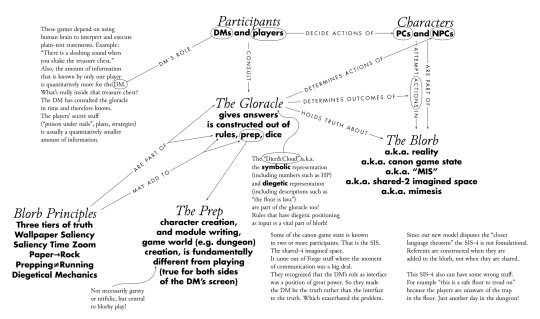
to sandra, 'blorb' is a statement of the type of roleplaying she finds vastly more satisfying to operate, and the crucial elements to make that happen.
what I find interesting about blorb is that, since its main interlocutor is the Forge/story-games tradition, it puts a fair bit of discussion into how this affects the fiction in practice. e.g. what you should prepare and what you can still improvise, and how the existence of the 'gloracle' (the combination of prepped materials and dice/rules, and rigour in consulting them) shapes our notion of 'the fiction'.
via this post, vincent baker back in 2012 defined RPGs thus:
To me, the crucial feature that makes a game an RPG is that it works by the (so-called) lumpley primple: in order to play, we have to create fictional stuff and agree that, for gameplay purposes, it's true. This is a pretty technical and inclusive definition. It includes Once Upon a Time and that game where you sit in a circle and pretend that some of you are werewolves, for instance.
something I find very interesting RPGs is the process of 'synchronisation' of the shared fiction. the idea of 'shared fiction' is something of an elaborate illusion. every player has a different version of it, with different emphases, different things that are fresh in memory, different interpretations of the images...
consider verbal descriptions of locations. my sense of what is in a scene will constantly be adjusted based on the stream of description I'm receiving from other players - the 'shared fiction' is at best something we approach asymptotically.
in an extreme example, a DM could lead with an elaborate description of the architecture, decorations, and layout of the room, before wrapping up with 'and curled around the central pillar is a mighty red dragon'. dun dun dun! suddenly, I have to recontextualise everything in the scene I was building in my head to accomodate the presence of the dragon.
the unreliability of this communications channel was a source for a vein of classic D&D humour, such as the Dread Gazebo of yore, where the communication channel breaks down leading to an inconsistency in the 'shared' fiction.
'no myth' and similar ideas come from the recognition that, until something is said out loud and enters part of the shared fiction, it can be changed freely between any possibility consistent with the 'established' facts. sort of like the wave function collapse algorithm. they take the attitude that you should do this deliberately to maximise drama and add complications, taking on more of a writer/director role. this character enters a bar, what should they encounter there? it would be fucked up if they encountered their ex, right? ergo their ex is there.
there is a degree of this in every RPG, not just your high-improv post-Forge story games. in order for some sort of consensus to be reached, parts of it must be black-boxed and unpredictable. for example, if I am inhabiting a character, I have my idea of how they will act and what they're feeling and thinking about, and that's authoritative. but that means for everyone else's characters, I have my impressions and predictions, but they're subject to being updated as soon as that player speaks.
for Sandra, this recognition that everything is getting moved around for drama undermines the substance of the world - an inescapable awareness even if the players take pains to make the established, spoken-out-loud fiction consistent.
so, additional 'authority' is central to the 'blorb' playstyle. that is, in addition to each player's authority to make up stuff within their domain (e.g. what their character does), you make a big point of deferring to some additional authorities such as pre-prepped material and dice (which Sandra calls the 'gloracle'), and making it explicit to the players that you're doing so. for example, you might talk about the random encounter tables you're using and what would change their contents, or declare the DC before every roll.
it's kind of a defensive style of DMing, in that it's entirely designed to forestall any suspicion of 'fudging' behind the scenes. the tradeoff is: more explicit discussion of game mechanics which might detract from the sort of 'atmosphere', but equally a stronger sense of inhabiting an external world where things are 'really' happening 'offscreen'.
to me, the idea of 'fudging' doesn't bother me nearly as much as it seems to bother Sandra, but I think there is some truth to the thought that if everything is subject to random tables or pure off-the-dome improv, the game can start to feel a very homogeneous. as Sandra puts it in one of her articles:
I don’t want to expand randomly as we go either, because if everything is randomly rolled as you go along, where’s the agency? South becomes the same as north becomes the same as west because wherever you go, the dice are furnishing for you, so the choice about where to go matters less.
it's probably got something to do with information theory, right? once you become familiar with the table, and you know when the table will be invoked, you've broadly found out what there is to know about that thing. there are only so many bits of information.
I was saying the other day, games are interesting because they are something to explore through interacting with them to discover all their weird nuances. players are pretty good at sniffing out how complex and varied the underlying system is. a wide set of interesting, spicy locations - and logical relations between them - has more nuances to discover than a random table with, say, 10 entries.
the problem is of course that such a prep-focused playstyle can lead to huge amounts of 'wasted' effort fleshing out elements of the gloracle which may never be activated, especially if players don't spend their time rubbing against your creation in various ways to discover its nuances. Sandra's approach is to work out what's easy to improvise on the fly (the 'wallpaper') and what is crucial to pin down in advance, and largely prepare the latter - the difference, I guess, coming down to experience. we can think of it in programming terms: a small authoritative state and things that can be derived from that.
in my experience, at least some players have become a lot more considerate of the workload of GMing. far from trying to resist 'railroading', they will often generally deliberately try to steer themselves towards whatever location a DM has prepared as a courtesy; meanwhile the GM will be able to get a sense of where the players are planning to go so they can prep between sessions. however, that is contrary to the more 'sandboxy' approach where the core appeal is 'you can do pretty much anything', which is what Sandra is trying to generate I think.
I'm too much of an improv-focused GM to really become a partisan of 'blorb' - for me, discovering improv-oriented story games after D&D was as revelatory as discovering D&D after storygames was for Sandra lol. I trust somewhat in my ability to come up with weird interesting stuff on the fly and flesh it out later, and I tend to find the moment of being in the hotseat of an RPG gets the creative juices flowing like nothing else, so it's actually quite difficult to come up with anything good during prep.
however, I think there is a lot to be said for the value of making at least certain things concrete, and communicating that to the players, and Sandra makes a good case for showing your hand. it's a way to make the shared fantasy take on certain qualities it won't have if it remains purely arbitrary improv, even if the only real functional difference is when you make something up. both because it's hard to keep track of everything in your head without some kind of aid, and because the first idea you come up with will rarely be the richest, most interesting.
so next time i run a game, I'm not going to take such a zero-prep, all-improv approach, but try and work a bit harder on 'overall consistency'.
definitely a provocative blog to encounter...
47 notes
·
View notes
Text
gotta figure out some way to reference some random conversation I have locked in my memory with the DM about lying
send help I got a bit too excited and now have too many ideas for a dnd character and idk if there will be enough time for the ideas
#Said in the tags before but it’s actually the Wheel of Time ttrpg not dnd (is based on pathfinder tho)#the conversation was in fact based around lying about your age in Wizard 101#formative memory I guess? Idk it’s just stuck up in here now
1 note
·
View note
Text

bog tour - countdown to 1 year of games
T MINUS 7 DAYS
If you've missed all my posts about it so far, welcome to bog tour, a series of posts where I countdown to my 1 year anniversary of posting ttrpgs, April 1st. In the 16 days leading up to it, I am posting some commentary of one of my 15 published games plus one extra (and secret) day! Today's game is 'bog body, watching'!
'bog body, watching' is a drawing game where you explore the world around you from your place underneath the peat.
Thoughts
A little bit of a different game here (can my 7th wetland themed game really be considered different in any way though?). A drawing game!
More use of a deck of cards as a tool! Almost a system here, my gosh! Suits as different elements like with Two Graves, and similarly based on a time.
The lists were fun to come up with, and consider the different steps of time changes. I did do a lot of editing between them, deciding that one I'd written actually worked better for a different time period.
This game also feels deeply rooted in indigineity. It's maybe not explicit as such, but it feels like it's very informed by it, at least in the ways I wrote it. I hope that comes across!
Fav parts
The lines 'Rot cannot harm you in here.' and 'You are very nearly unchanging, and there is a dark power in remaining while everything else changes.'
The question for when you draw a king of any suite being 'What has become of your legacy?' is a fav part for sure!
Stats
'bog body, watching' has 512 views (6th highest viewed) and 101 downloads (6th most downloaded). It has 3 ratings, and is in 41 collections (4th highest).
'bog body, watching' is a drawing game about rot, change, and legacy. get it for pay what you want or koha here.
Come back to this here establishment tomorrow to hear Secrets about 'Wetland Natures for Wanderhome'!
4 notes
·
View notes
Text
I have been using something other than an intro as my pinned as a while, so y'all probably already know me, but...
did you know I take requests/trades/comissions? I really want to do/make things for people, free, trade, etc <3
Anyways, I'm Soul! You can find all my links and stuff, including that, hereeeee: linktr.ee/soulingual
I'm a part-time linguistics student! I speak Spanish and Indonesian and I would like to write and read more. Recent obsessions include Critical Role, Stray Gods, and Hadestown. I love ttrpgs and am constantly delighted and dissappointed by fandom.
I'm also hypermobile, autistic, and have OCD (optimization and tourettic subtypes). If you have any questions about this, I'm actually really happy to answer.
Sideblogs:
@redundant-ominious-threats (kinda dormant)
@polldownhadestown (dormant)
@tlosc (I don't post there, but that's not the point)
and a few I mean to delete
If you're in a good or neutral mood, I love to recommend fiction/poetry/movies to folks! If you're in a bad place, I recommend HELLO, CRUEL WORLD: 101 ALTERNATIVES TO SUICIDE FOR TEENS, FREAKS, AND OTHER OUTLAWS by Kate Bornstein. We'll get through this.
Free Palestine. Reject Dystopia. Human rights belong to all. Don't forget to be awesome!!
15 notes
·
View notes
Video
youtube
Dustgrave, a Lancer first supplement is out, so let's talk about the talents within it!
#youtube#ttrpg#lancer 101#talents#dustgrave#putting an unstable NHP in your mech is like putting a GPU that's way too damn big in your computer#lancer rpg
36 notes
·
View notes
Text

6 notes
·
View notes
Text
No plan, no matter how well-thought out or intricate usually survives contact with the players. Plan carefully, but be prepared for the unexpected. Play the game before the game and have fun with it. This is where the hidden fun of Game Mastering truly lives.
#rpg#rpgblog#rpgblogger#rpgwriter#ttrpg#TTRPGblog#TTRPGblogger#ttrpgwriter#•#Game Master Guide •#Game Master Tips •#Game Mastering 101 •#GM Advice for Beginners •#How to GM a Game •#How to Prepare for a TTRPG Session •#Improve Your GM Skills#Roleplaying Game Advice •#Roleplaying Game Strategies •#RPG Community •#RPG Session Planning •#Running a Tabletop RPG •#Tabletop Roleplaying Games •#Tabletop RPG Storytelling •#TTRPG Resources •#TTRPG Session Prep •
0 notes